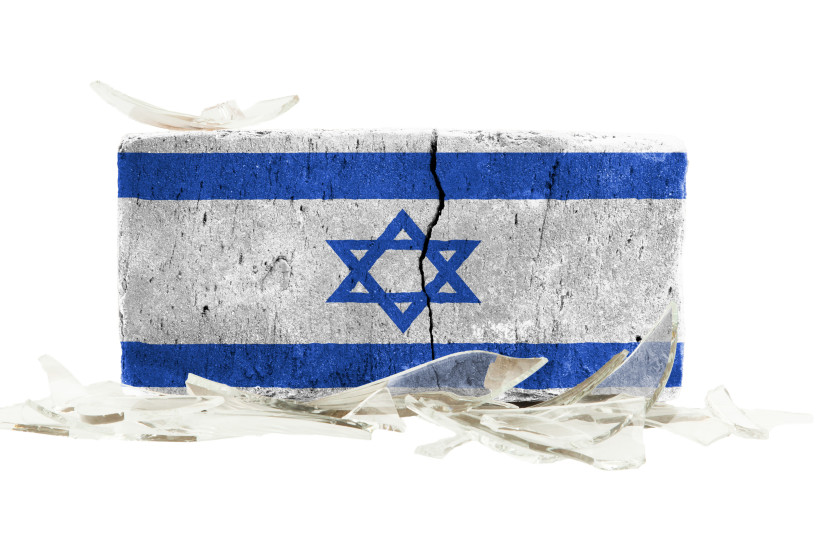
It’s no secret – Israel is a place of constant turbulence. But it’s not something everyone expects.
Getting my teudat zehut (ID card) at the young age of 18 – a little over 10 years ago at the time of writing – I made aliyah with my heart full of naivety and youthful optimism about my new home. Even the bureaucratic nightmare that was the Interior Ministry wasn’t enough to dampen my spirits.
And when elections came up a few years later, I was excited to take part in the democratic process and vote for the first time in my life.
After that, I got a job at The Jerusalem Post, a literal dream come true for someone who grew up reading this publication, a fixture of Shabbat table conversations. Starting out as a copy editor, I began my time at the Post shortly after elections were called in 2019. From there, I had a veritable front-row seat to current events, watching the story of Israel in my still relatively new home country up close.
In that time, my career has advanced, going from copy editor to now assistant managing editor of jpost.com. And in that time, Israel has changed considerably, too.

But spoiler alert, that change is not for the better.
How the rot festering at Israel's core has been exposed
Over the course of five elections, multiple COVID lockdowns, two Gaza operations, one judicial reform crisis, and now one war, much of my youthful idealism has been shattered, weakened by the rust of election fatigue, petty political infighting, extremist political views from all sides, and a major bungling of our country’s military and medical security.
I am more aware than ever of the unsustainable high cost of living, of the housing crisis, of how different electoral platforms impact various levels of society, how our country’s legal system and political leadership clash to the point of veering dangerously close toward dysfunction.
Some may call this just growing up. I call it overcoming tunnel vision because that’s the real problem here. It’s not that Israel has really changed so much, but rather that these past few years have just exposed all the problems that have been hiding under the surface for so long.
Politicians who prioritize short-term gains for the sake of maintaining power over long-term planning to address major societal issues; an out-of-date bureaucracy that struggles to stay afloat amid crises like COVID or war; a growing population beset by a rising cost of living that, despite multiple efforts, has not seen much change at all; a divide between religious and secular Israelis that only seems to get worse every year; and, of course, the seemingly never-ending conflict with the Palestinians, regarding which every government since Ehud Barak has been content with just kicking the metaphorical can down the road, avoiding any means of bringing change to an unsustainable powder keg of a status quo.
Except for Prime Minister Benjamin Netanyahu, who had the bright idea of letting money be sent to Hamas. Because what could go wrong there? What? The October 7 massacre? That could never happen, right?
What makes it worse is that so many of the ideological divisions in Israel are, as I have since realized, often very performative rather than anything substantial. People, especially politicians, seem to pick and choose priorities based on what sounds the most important rather than where their ideologies actually lie.
Take the ongoing crisis with the hostages held by Hamas in Gaza. The government has made vocal its priority in destroying Hamas. But what about the hostages? Is the government actually doing enough to try to save them? The families of the hostages don’t think so, and even called the government out on this multiple times, accusing them of prioritizing wiping out Hamas and pushing for the death penalty for terrorists, regardless of the dangers it could pose to the hostages.
In November, National Security Minister Itamar Ben-Gvir posted a photo of himself holding on to one of the relatives of the Gaza hostages and expressed his solidarity. That same person said in response on social media: “I told you not to hug me, and you hugged me anyway. I told you not to risk our loved ones, and you risked them anyway. All that for a photo.”
But that much is expected from the far Right – after all, this is basically in line with Ben-Gvir’s platform since day one. No wonder he’s now calling for the Israeli resettlement of Gaza when the war is over.
More damning, though, is the silence from the ultra-Orthodox parties in the government with him.
The Jewish concept of pidyon shvuyim, or “return of the captives,” is one that has long been considered an incredibly important religious obligation. According to the Talmud, captivity is considered to be a fate worse than death or starvation, and Maimonides said that “there is no greater mitzvah” than freeing captives. Even the Shulchan Aruch agrees, writing: “Every moment that one delays in freeing captives, in cases where it is possible to expedite their freedom, is considered to be tantamount to murder.”
It’s not like this is some archaic custom that has just been forgotten about, either. Every now and then, ultra-Orthodox news sites will release articles about pidyon shvuyim cases around the world, such as in 2022 when a Jew was imprisoned in Cyprus, and an effort was made to raise $108,000 to free him, as published at the time by ColLive. But have the haredi parties today weighed in on this? Has their council of Torah sages released an opinion about it publicly?
Not so publicly, they did agree to support the first ceasefire deal after a debate over whether they should just abstain instead of voting in favor, as reported at the time by haredi media. Otherwise, they and the Chief Rabbinate have stayed silent. That’s something the me of 10 years ago couldn’t have ever imagined. But today? I’m not even remotely surprised.
GROWING UP, one of my favorite books in high school was The Jungle by Upton Sinclair. It famously exposed the unsanitary practices of the American meatpacking industry, with the shiny metal can containing diseased meat being a metaphor for the American Dream.
These past few years, to me, have been Israel’s “Jungle” moment. The shiny can of my idealism when I arrived has been broken open, and now I, and the rest of the world, can see the diseased meat that lies inside. But just as The Jungle helped lead to the creation of the US Food and Drug Administration, it’s not too late for this to lead to changes here to fix the rot that has been allowed to persist at Israel’s core for too long.
Good luck to those trying.
The writer is assistant managing editor of jpost.com.
